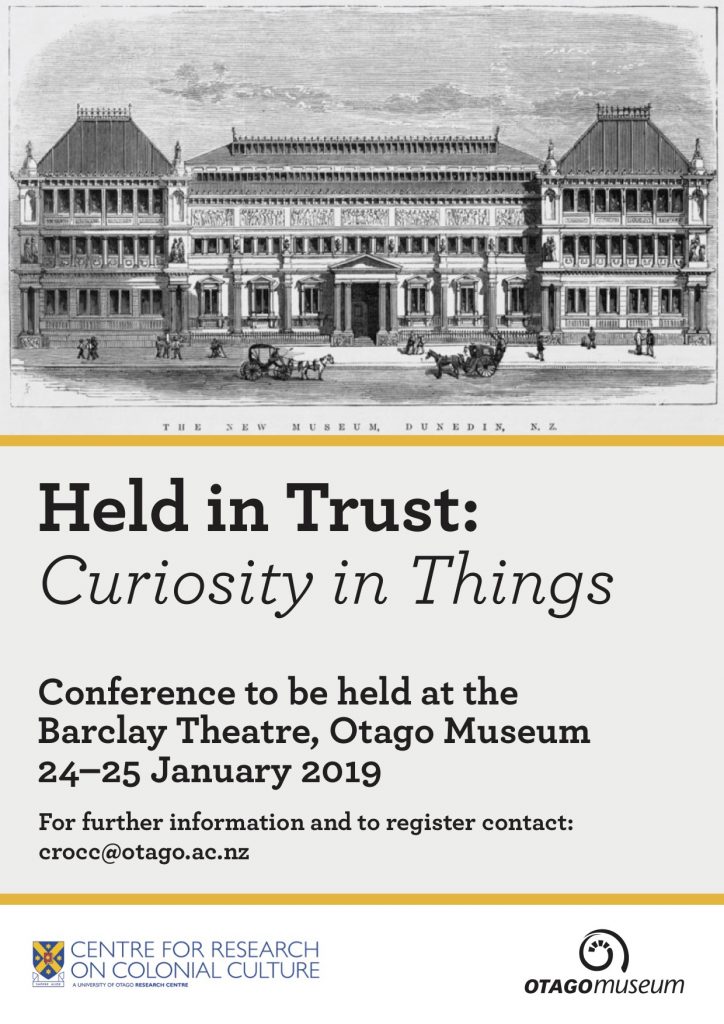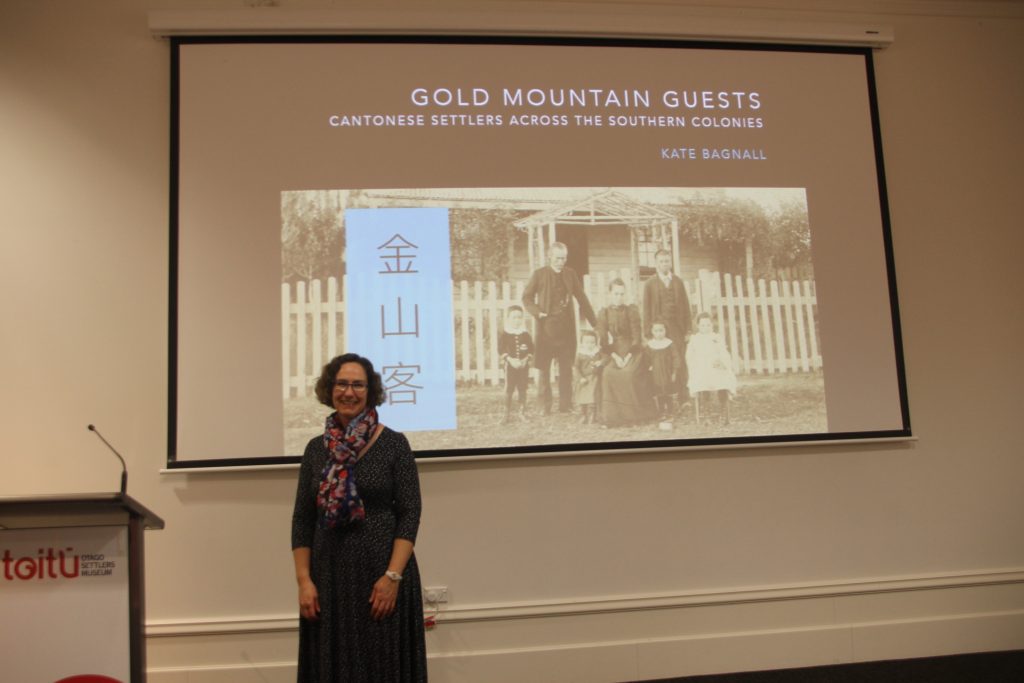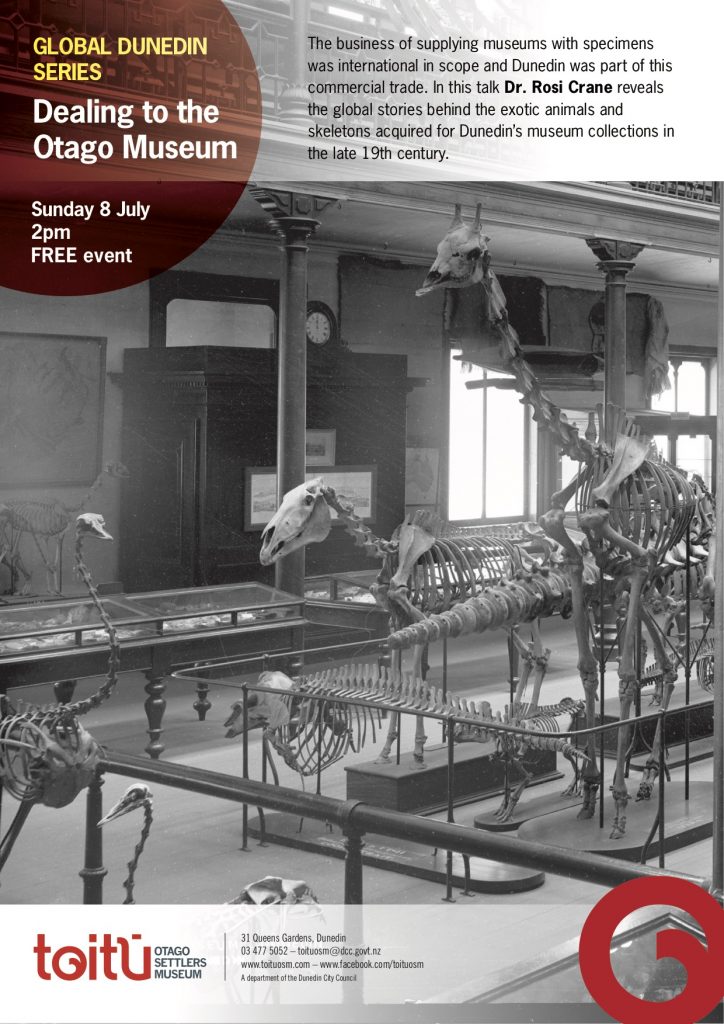Held in Trust: Curiosity in Things Conference
Just a reminder to register for the Held in Trust: Curiosity in Things Conference to be held at Otago Museum on 24-25 January 2019. This is a FREE event, so please do register your interest in attending by contacting us at crocc@otago.ac.nz
Global Dunedin Series
In June, the Centre was delighted to host one of our favourite historians, Dr. Kate Bagnall, who was visiting Dunedin to conduct research at local archives for her current project tracing Chinese naturalisation across the British colonies. Kate also kindly presented on an aspect of this research in our Global Dunedin speaker series. In her talk she traced the legal and personal histories of naturalisation, connecting the Dunedin experience into a larger Australasian setting, arguing that tracing naturalisation processes and records helps to uncover different histories of migration and mobility from the standard narrative of single male sojourners. This is particularly important research because Chinese presence in the British colonies is often told through a focus on exclusion and immigration restriction. Incredibly, Kate also presented fresh research barely hours old from her visit to the Dunedin archives, revealing that there were 450 Chinese who naturalised in New Zealand prior to 1908, with 197 of those in Otago. The first in Otago was Louis Gay Tan in 1870. We thank Kate for a wonderful lecture and wish her all the best for the research project.
Our next Global Dunedin lecture will be given by Dr. Rosi Crane on July 8 on the international trade in museum specimens during the nineteenth century. When the Otago University Museum opened in its new building on Great King Street in 1877, amongst other things there was a giraffe skeleton, a stuffed lion, several monkeys, and innumerable birds from Australia, Europe, India and New Zealand. From the outset the collections were international. Many of the exotic animals came to Dunedin from commercial dealers from London, Sydney, Bremen and Prague. Some of the purchase money came from limited museum funds but most came from trading moa bones. Kiwi and kakapo skins had their value too but they were not as valuable as moa. A few scraps of correspondence has survived which tells us the price that these animals fetched, what else the dealers had to offer and what the curators wanted to fill perceived gaps. The business of supplying museums with specimens was extensive and Dunedin was part of this global network of supply and demand. The story of how historical commercial trade practices have impacted on the Museum is told here for the first time.
Held in Trust: Curiosity in Things Conference
Call for Papers
HELD IN TRUST: CURIOSITY IN THINGS
A conference co-sponsored by Otago Museum and the Centre for Research on Colonial Culture, University of Otago
24-25 January 2019
Barclay Theatre, Otago Museum
The history of museums has largely been framed under the rubric of colonial domination or building cathedrals of science. But what are the bigger stories that motivated the creation of the collections?
Objects have the capacity to tell stories of lives and communities that are interconnected over space and time. Objects are the tangible material world of scientific endeavour and during the nineteenth century trade in them boomed, yet accounts of the political context surrounding their discovery and translocation are overlooked.
Looking beyond object biographies, tales of eccentric collectors, acquisition and institutional histories, this conference foregrounds the global context of commercial trade and exchange networks that contributed to the patterns of knowledge discovery and creation. What then are the bigger stories of culture, economics and politics that formed our colonial museums?
We invite contributions that address the broad theme of knowledge production in the colonial museum.
Keynote speakers:
- Professor Tony Ballantyne FRSNZ Co-director Centre for Research on Colonial Culture and Pro-Vice Chancellor Humanities, University of Otago.
- Professor Simon Ville, Senior Professor of Economic and Business History, School of Humanities and Social Inquiry in the Faculty of Law, Humanities and Arts, University of Woollongong.
- Associate Professor Conal McCarthy, Director of the Museum and Heritage Studies programme at Victoria University of Wellington.
Please send your abstract (max. 250 words) and one-page CV to crocc@otago.ac.nz by September 15th, 2018.
For further information, please contact Rosi Crane (Rosi.Crane@otagomuseum.nz).




